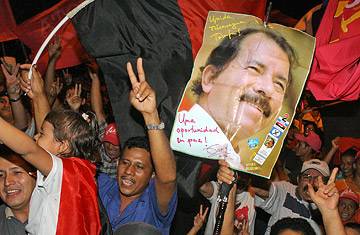
Supporters of the presidential candidate Daniel Ortega of the Sandinista National Liberation Front (FSLN) celebrate his election victory in 2006, in Managua.
When the Sandinista National Liberation Front (FSLN) was voted out of power in 1990 after a decade of battling U.S.-backed contra insurgents, many of its supporters from the United States and Europe packed up their bandanas and Birkenstocks and went home with a good story. The Nicaraguan revolution was over, and most of the "Sandalistas" (the nickname that combined their preferences in politics and footwear) saw no point in staying on: There was nothing sexy about helping out a centrist transition government led by a grandmotherly widow when you'd been drawn here by the allure of a regime of guerrilla poets.
But not all of the volunteers departed. A smaller, more dedicated group of internationalists stayed behind, unconvinced that their work in Nicaragua was over simply because the government was again wearing business suits rather than olive-drab fatigues. These were the folks driven by a long term commitment to people and issues, rather than a bandwagon cause de jour; the ones who snarl at the label "Sandalista."
The internationalists who stayed behind continued to work on the issues that embodied the finest aims of the Sandinista revolution — bringing healthcare and education to remote corners of the country, empowering women and peasants, providing micro-credit loans to farmers, and delivering drinking water and latrines to the rural poor. Today, many live simple lives eating rice and beans for breakfast, speaking a Spanish that drops the s at the end of words, a signature of a Nicaraguan accent. A group of several dozen of them gather each week to discuss social justice issues at the Casa Ben Linder, the Managua meeting house named after the only U.S. citizen killed by contras in the 1980s.
During the meetings, participants use old revolutionary phrases — "the pedagogy of the oppressed", "liberation struggles" and "cosmovision." Their politics are unabashedly leftist, their preference is for the poor, and their footwear is varied. In fact, at a time when even Ortega is courting transnational investors for free-trade zones and negotiating agreements with the IMF, the group at Casa Bin Linder seems more traditionally Sandinista than today's Sandinistas are themselves.
The internationalists are certainly aware of the discrepancy: In the decades following the revolution, many in the solidarity movement began to lose faith in the party's leader, President Daniel Ortega, who became embroiled in property scandals, sexual abuse allegations by his stepdaughter, and an odious power-sharing pact with erstwhile sworn enemy and arch-conservative Arnoldo Aleman. So, when Ortega managed to get reelected in 2006, even those who had originally come here to support his first government were leery of his return. And now, after a year in office, that caution has turned to criticism.
"In the '80s, we worked side by side with the government, but there is no longer a revolution here and this is not the government of the '80s," said veteran public health activist Maria Hamlin, who first moved to Nicaragua in 1968. Hamlin said many activists have a hard time supporting a government that recently banned life-saving therapeutic abortions for women. But instead of hearing those criticisms, the current Sandinista government has shut the door on civil society. "It was easier for us to work with the Ministry of Health under previous [conservative] governments than it is now; and that's very sad for me to say," Hamlin lamented.
Another longtime leader in the solidarity movement, who spoke under the condition of anonymity for fear of government reprisal, said anyone who thought Ortega's reelection would mark a return of revolution is "freeze-dried in the 1980s." The Ortega of today, she said, represents the same economic and business interests as the conservative right, only with a "schizophrenic discourse" that tries to tap the revolutionary appeal of the past.
A U.S. activist who runs service projects in rural Nicaragua says the Sandinista government she had been willing to die for 20 years ago is now one she fears to criticize. When asked to comment for this article, she answered, "I do not want to be deported. I would not want to say anything that might offend the present government."
Dena Fisher, a retired public health professional from New York who first visited Nicaragua in 1986 and still runs a project here, says Ortega's return has actually made it harder for her group to raise funds in the United States, because people don't want to be in solidarity with the current Sandinista government. She calls her project "humanitarian," and says she doesn't even like to use the word solidarity anymore.
So while the 1980s brand of internationalism has ended, there are still plenty of sandal-wearing gringo adventurers coming down to Nicaragua, though most now are looking to invest in inexpensive real estate and turn a profit. Of course, the old guard would say that's exactly what it means to be in solidarity with the new Sandinista government.
